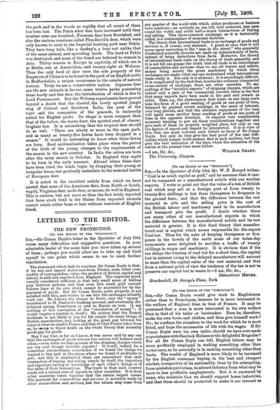LETTERS TO THE EDITOR.
THE NEW PROTECTION.
[TO THE EDITOR OF THE "SPEOTATOR.1
Szn,—Sir Conan Doyle's letter in the Spectator of July 18th raises many difficulties and suggestive questions. In your admirable leader of the same date you have taken up several of them ; perhaps you would allow me to take up and limit myself to one point which seems to me to need further elucidation.
The statement which fails to convince Sir Conan Doyle is that, if we buy and import motor-cars from France, some other com- modity of corresponding value, the product of British capital and labour, is sold and exported from England. The empirical proof, usually considered sufficient, is that only small sums of bullion pass between nations, and that even this small gold current follows lines of its own which cannot be accounted for by the payment of goods. But Sir Conan Doyle, quite properly, is not satisfied with this, and wishes to see how the exchanges actually work out. He follows the cheque to Paris ; sees the "money" transferred to M. Panhard's banking account, and eventually dis- tributed among Frenchmen or sent to Russia on loan. (I say nothing of this conception of the "circulation of money"; it would require a treatise to itself.) He notices that the French workman is not likely to buy for his simple life many things of British manufacture, and, looking at the great gap between the value of what we send to France and that of what France takes from us, he seems to throw doubt on the whole theory that normally goods pay for goods.
May I say that, so far as I know, it was never said by any one that the exchanges of goods between two nations will balance each other,—even when we take account of the shipping charges which are our real though invisible exports ? It would, indeed, be a somewhat extraordinary coincidence if we found the things we wanted to buy just in the places where we found it profitable to sell ; and this is emphasised when one remembers that each transaction of buying and selling stands by itself, the importers and exporters having no knowledge of each other's doings or of the value of their transactions. The truth is that each country sends out a certain sum of exports to other countries. It is from other countries taken together that the return import comes. The payment for commodities and services is normally made by other t;enunodities and services, but the return may come from any quarter of the world with which either producers or bankers have relations,—as certainly as one bill, duly endorsed, may pass round the world and settle half-a-dozen transactions of buying and selling. This three-cornered exchange, as it is technically called, is a commonplace of economic doctrine. The theory that international trade is an exchange of goods and services is, of course, very abstract. I grant at once that it will never carry conviction to the " man in the street," who generally thinksthat scientific theories are made up independently of facts, instead of being deductions from facts. Moreover, the theory of international trade rests on the theory of trade generally, and it is not till one grasps the truth that all trade is an interchange of commodities and services—that we are all buyers and sellers, money being merely the great machinery by which these exchanges are made—that one can understand what international trade really is. Not only is it abstract ; it is exceedingly difficult. It is complicated by the fact that, besides the ordinary commercial cross-current of exchange, there are other currents. To say nothing of the "invisible exports" of shipping charges, which are indeed only a part of the commercial current, there is the fact that many exports have been made in the past and remain as debts. Take, e.g., the phenomenon that loans on any large scale take the form of a great sending of goods at one point of time, balanced by gradual return sendings, in the name of interest, over long periods, and that the ultimate repayment of the loan will again mean another large sending of goods at one point of time in the opposite direction. It requires very considerable economic training to put all these considerations together and give each of them its properly weighted place, but only so can the figures of export and import be interpreted. It is in view of this that one must welcome such letters as those of Sir Conan Doyle. Not only do they give the best proof of the real diffi- culties which honest truth-seekers find in such matters, but they give the best indication of the lines which the education of the nation at the present time must follow.
The University, Glasgow.






































 Previous page
Previous page